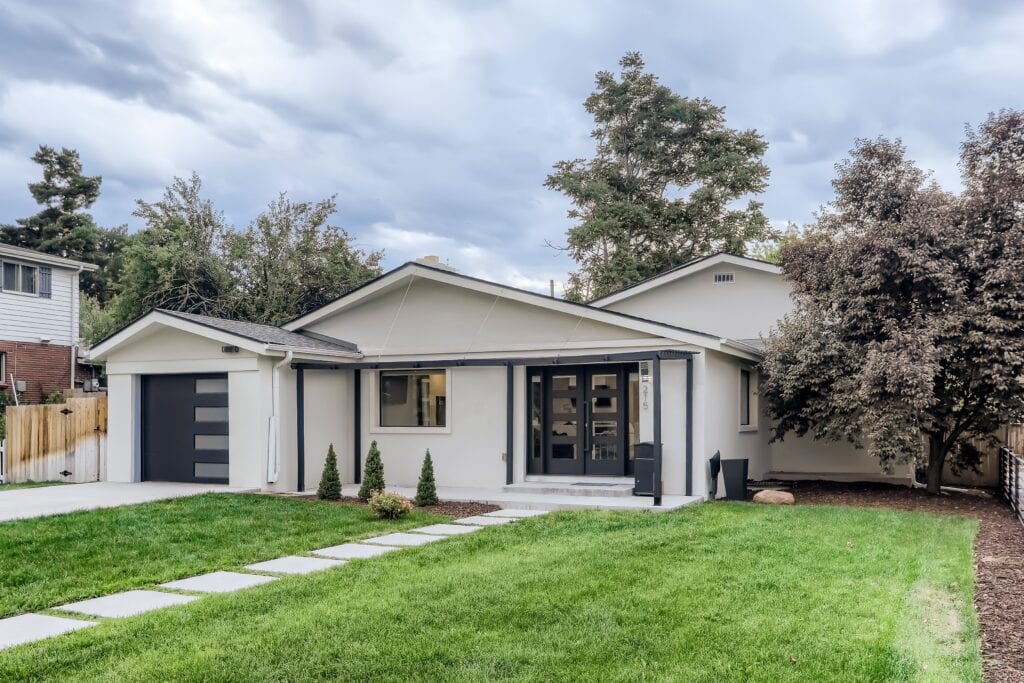Founded in the 1800s during the gold rush, Denver, Colorado, is known for its beautiful views of the Rocky Mountains and abundance of natural beauty. Home to a myriad of sports teams, a vibrant arts and culture scene, and plenty of hiking and biking opportunities, you’ll be hard-pressed to run out of exciting things to do in the city!
If you’re a seller, buyer, or real estate agent in Denver, knowing the market forecast for 2025 is vital. Keep reading to learn more about Denver’s real estate market and the future for sellers and buyers alike.
Denver housing market forecast
The Denver housing market has experienced notable shifts recently. As of February 2025, the median home sold price was $585,533, reflecting a 2.6% decrease from the previous year. The median price per square foot stood at $371 during this period.
As reported by REColorado, new listings increased by 130% in January 2025 from December. Despite this surge, closed sales declined by 29% month-over-month, indicating a slower start to the year. A 32% increase in pending listings indicates a growing resurgence in buyer interest, as the median closed price dropped slightly in December 2024 to $575,000 from $579,975.
Average home price in Denver
In the next two years, Denver’s median home price is expected to rise by 3% to 4% annually. By 2025, a 3% annual increase in the median home price would lead to an average home price of approximately $592,250, up from its current $580,000 price. With a 4% growth rate, the figure would reach around $598,000.
Average rent in Denver
The rental sector in Denver has also seen adjustments. REColorado reported in January 2025, 252 properties were leased through their MLS, marking an 18% decrease from the same period in 2024.
The median leased price for Denver rentals was $2,625, showing slight declines both year-over-year and month-over-month. Though new rental listings decreased by 13% annually, they still showed improvement from December 2024 figures. This indicates that there is still a demand for rentals, even thought activity has slowed.
Denver neighborhoods
You’ll find an abundance of attractive features throughout various Denver neighborhoods. A family-friendly atmosphere, walkability, and plenty of locally-owned restaurants await you!
Congress Park
Congress Park offers a walkable and bikeable neighborhood, with a walk score of 83 and a bike score of 89. Residents praise its family-friendly feel and safety, noting that it’s easy to stay active with an abundance of parks in the area.
North Park Hill
Located 10-15 minutes east of downtown Denver, North Park Hill offers residents a fun, laid-back feel to the area. Locals mention feeling safe and appreciate the abundance of street parking and walking distance to both parks and coffee shops.
Washington Park
With great restaurants and shopping close by, residents love being slightly south of downtown Denver and the chance to get a break from the hustle and bustle of the city. You’ll get an outstanding balance of nature and city if you live in this area.
Wellshire
Zoned for one of the highest-rated elementary and middle schools in Colorado, Wellshire offers a tight-knit community filled with families and young children. Residents appreciate the easy access to supermarkets, movie theaters, and local businesses.
Cheesman Park
Cheesman Park residents love that you can get everything you need shopping-wise just by walking a few blocks. Shop owners take pride in getting to know the local community, so you’ll appreciate the family feel throughout this neighborhood.
Denver economy
If you’re considering moving to Denver, Colorado, there are many good things to think about Colorado as a whole! U.S. News ranks Colorado in the top 20 U.S. states for their infrastructure, education, health care, and economy—with its economy ranking fourth out of all 50 states!
Denver’s unemployment rate has slightly increased from 4.6% in December of 2024 to 4.9% in January of this year. Per Linkedin‘s job search, as of March of 2025, Denver, Colorado has over 50,000 job openings. This means there are plenty of choices for those searching for jobs, making a move to Denver and finding a job easier than in other cities and states.
Businesses headquartered in Denver include Chipotle, Frontier Airlines, Coors Brewing Company, Smashburger, and Quizno’s.
Denver’s real estate market moving forward
The Denver real estate market in 2025 presents a landscape of stabilization and modest growth. While home prices have experienced slight declines, the influx of new listings and increased pending sales indicate renewed buyer interest. The rental market’s adjustments reflect broader economic trends, yet Denver’s strong economic fundamentals suggest a positive outlook for both buyers and sellers.
Need real estate pictures in Denver?
If you want to make your listing more appealing and desirable on the Denver market, you’ll love what Virtuance offers with professional real estate photography! We provide virtual tours, aerial photos, and marketing enhancements that can help you sell your listing quickly and for more money. Sounds appealing? Virtuance is ready to help! Schedule your services today and experience the powering of standing out.
FAQ
As of February 2025, the median home sold price in Denver is $585,533, per Rocket.com.
REColorado reported in January 2025, the median leased price was $2,625, reflecting slight declines year-over-year.
Economic resilience, population growth, and sector performance in technology, healthcare, and energy are key influencers on Denver’s real estate market.
The Luxury Playbooks’ Market Forecast suggests modest annual increases of 3% to 4% in median home prices over the next two years.
Utilizing professional real estate photography and virtual tours provided by Virtuance can significantly enhance listing appeal.








